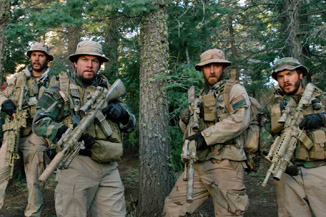|
|
The 400-Word Review: Lone SurvivorBy Sean CollierJanuary 13, 2014
The courage of Luttrell and his compatriots is beyond question, and has been well-represented in his own book and on television (the incident was extensively featured on “60 Minutes,” among other places). And in its attempts to represent the reality of war, Lone Survivor succeeds. Beyond that, though, is a toothless story presented with an alarming lack of emotion. What happens is terrible and vivid, but the story, such as it is, is one of random events and an outcome unlikely enough to render it free of grander meaning. In presenting it without flourish, too, Berg — who also adapted the screenplay and shares production credit — takes a documentarian’s ethos to what is clearly a dramatization. In that, he seems to pursue truth, but the effect is a sterile one. Maybe that’s part of the idea — that not enough attention is paid to these tragedies — but it leads to an unpleasant and fundamentally meaningless experience in the theater. My Rating: 6/10 Overall Rating on CriticsChoice.com: 83/100 Sean Collier is the Associate Editor of Pittsburgh Magazine and a member of the Broadcast Film Critics Association. Read more from Sean at pittsburghmagazine.com/afterdark
[ Read more 400 word movie reviews ]
[ View other movie reviews ]
[ View other columns by Sean Collier ] [ Email this column ]
|

|
|
|

|
Thursday, October 31, 2024
© 2024 Box Office Prophets, a division of One Of Us, Inc.


